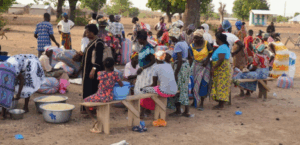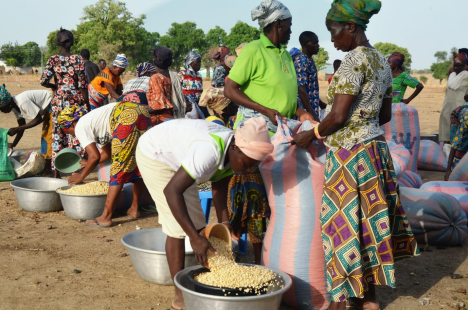A collaborative effort led by philanthropist Alhaji Seidu Agongo and community organizer Janet Abugre has provided critical food assistance to vulnerable residents of Adaboya-Kunkoe, a rural community in Ghana’s Upper East Region.
On Monday, April 28, approximately 70 elderly women, widows, and individuals unable to farm due to age, illness, or disability received shares of 35 bags of maize, distributed earlier than the annual initiative’s typical June timing to address urgent food shortages.

The initiative, now in its sixth year, originally supported 20 beneficiaries but expanded significantly this year with Agongo’s involvement.
Abugre, a native of Adaboya-Kunkoe, emphasized the decision to distribute food instead of cash to ensure direct access to nourishment. “What began as an effort to support about 20 individuals has now grown to reach around 70 beneficiaries, thanks to Alhaji Agongo’s generous contribution,” she said. Each bag of maize, valued between GHS 40,000 to GHS 42,000 in total, was divided among three households to maximize reach.
Adaboya-Kunkoe’s reliance on subsistence farming has been strained by erratic rainfall and poor harvests, exacerbating food insecurity. The distribution occurred at a neutral venue to minimize stigma, with young volunteers assisting bedridden or mobility-impaired recipients.
Community leader Bernard Adongo moderated the event, which opened with a prayer led by a beneficiary, underscoring the collective gratitude.
Agongo, an Accra-based businessman with a history of supporting marginalized communities, highlighted the partnership as part of his broader philanthropic efforts. While this year’s donation marks progress, Abugre acknowledged unmet needs, urging sustained support to reach more residents.
The initiative reflects a growing reliance on local partnerships to combat climate-driven challenges in northern Ghana, where inconsistent rains increasingly threaten agricultural stability.
Such efforts not only address immediate hunger but also reinforce community solidarity in regions disproportionately affected by environmental unpredictability.










